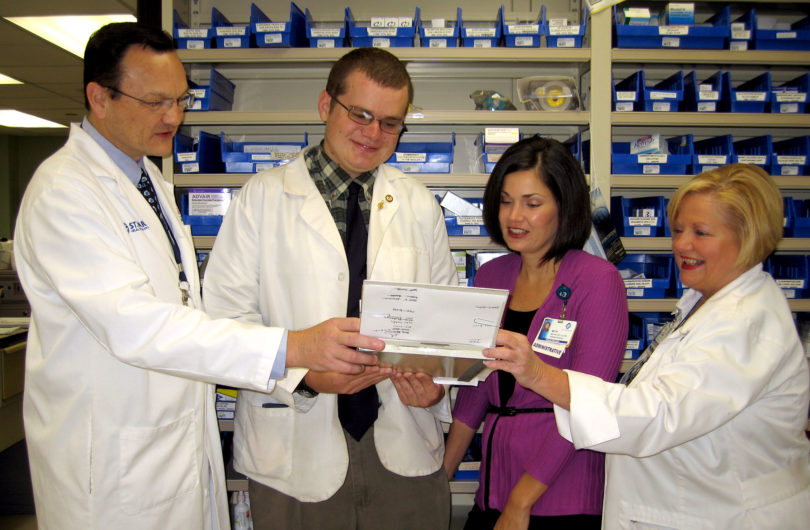Athens, Ga. – Students in the University of Georgia College of Pharmacy were part of a team of health care workers who helped make a unique diabetes specialty certification a reality for St. Mary’s Health Care System of Athens.
In September, St. Mary’s earned the Joint Commission’s Gold Seal of Approval for advanced inpatient diabetes care, making it one of two hospitals in the state and one of 38 hospitals in the country to earn a specialty certification for diabetes care.
St. Mary’s began working toward the voluntary diabetes certification about four years ago.
“Diabetes is one of the top contributing factors to cardiovascular disease-including stroke and heart attack-and one of the leading causes of amputations, blindness and other disabilities,” said Beth Melvin, a St. Mary’s diabetes education coordinator and head of the leadership team.
“Through aggressive identification, intervention and education, all members of our health care team-including pharmacy students-are helping our patients control their diabetes and prevent complications.”
Using guidelines recommended by the Joint Commission, UGA pharmacy students worked to assure compliance with standards of care specific to the needs of diabetes patients and families. They reviewed patient data, assessed treatment plans that included medication and dosing, participated in patient education and presented recommendations to physicians.
“This was a great learning opportunity in collaborative care,” said UGA pharmacy student Bryan White.
As a result of the collaborative environment, the College of Pharmacy was able to develop a five-week advanced pharmacy practice experience program in diabetes for its fourth-year pharmacy students, said Robin Southwood, an associate professor of clinical and administrative pharmacy at UGA. He is part of the St. Mary’s team of administrators and health care providers who led the inpatient diabetes care effort.
White recently completed the APPE program. Through it, he learned to evaluate data on a patient’s dietary intake, kidney function, steroid use and other issues that could impact treatment.
“Dr. Southwood and I would come to a consensus on a patient’s care,” he said, “and I would often make recommendations directly to the physician. I learned the importance of gathering appropriate data and communicating with a variety of health care professionals.”
About 40 percent of patients who enter Georgia’s hospitals have diabetes in conjunction with other medical problems.
“Having pharmacy students develop an interest in diabetes care and education is very important for the future health of our population,” said Robbin St. John, a UGA alumna and St. Mary’s pharmacy educator. “Often when [patients] come into the hospital, diabetes is not their primary condition, so these pharmacy students benefit from the interactions required among specialists in other disease states for treating diabetes and other health care problems.
“Students become part of the health care team, and it’s to our benefit for them to be there and help care for our patients with diabetes.”
Other advanced pharmacy practice experience rotations at St. Mary’s include general medicine, infectious diseases, critical care, pharmacokinetics and nutrition support.







